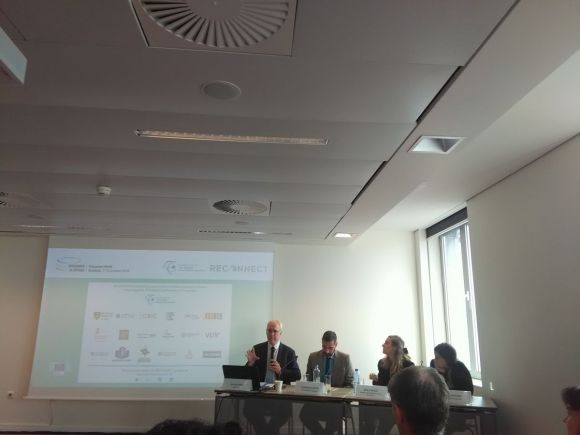
In a time when nationalistic policies have been thriving, the value to be a Union may appear antiquated. The session “Let’s unite! Reconciling Europe with its citizens to build a more democratic and closer Europe”, that took place on 8th October from 11.30 to 13.30, proves this belief to be wrong.
During this session, stakeholders from the academia and civil society explained the beneficial impact of the creation of new synergies within the European Union; these connections involved universities, local authorities and NGOs, but first and foremost, European citizens. Indeed, European citizens represent the very backbone of the Union: their distrust undermines its credibility and their diffidence weakens the integration process.
To address these issues, several projects have been recently launched in different European States. In the academic field, the RECONNECT project stands out. As Prof. Dr. Jan Wouters pointed out during the session, RECONNECT is an academic project, launched in 2018 by the University of Leuven and other 17 European institutions, that aims to carry a close study on the implementation of EU core values. For instance, RECONNECT partners investigated how to foster a greater discussion and awareness on European issues between citizens, like the regional disparity between Western and Eastern Europe, or the rule-of-law backsliding in Hungary and Poland.
In the field of civil society, representatives from TIPS4EU (Tools for an Inclusive Sustainable Participative European Union), ALDA (European Association for Local Democracy) and Urban Lab provided examples on how the European Union can be undergirded by the citizens’ engagement. In the case of TIPS4EU, the focus was set on the promotion of EU citizenship as a condition boosting civic and democratic participation. For instance, TIPS4EU engaged with disadvantaged young people from rural communities in Bulgaria: they trained them to organize political and civic initiatives in their territory, therefore incentivizing the creational of local networks that highlighted the opportunities offered by the EU.
In the case of ALDA and Urban Lab, the attention was set on the social and urban equality goals of urban communities, whose sustainability represents a key goal in the EU plan Horizon 2020. From the point of view of Sofia Caiolo, ALDA’s project manager, the livability of modern cities depends on their capacity to deal with cultural integration and social engagement: both elements are particularly important in the case of newly arrived migrants and young people. In the Danish city of Vejle, for example, ALDA promoted a project aimed to address the cultural barrier between local residents and migrants through the organization of social dinners.
If ALDA focuses on the social aspect of the urban living, URBAN LAB explores the process underlying the very definition of urban space. According to Chiara Lucchini, URBAN LAB’s regional development manager for the Italian region of Piedmont, the definition of urban space is subject to an ongoing process of transformation. Its challenges can be addressed only through the creation of connections between citizens and political stakeholders, whose views on the city space may diverge only because they live in different districts on the same metropolitan area.
All together, the commitment of academia, civil society and local authorities can generate a more cohesive Europe, whose fundamental pillar is the engagement of citizenship in a closer and more democratic Europe.
Written by: Barbara Polin (Italy)
Edited by: Iskra Tsankova (Bulgaria)



